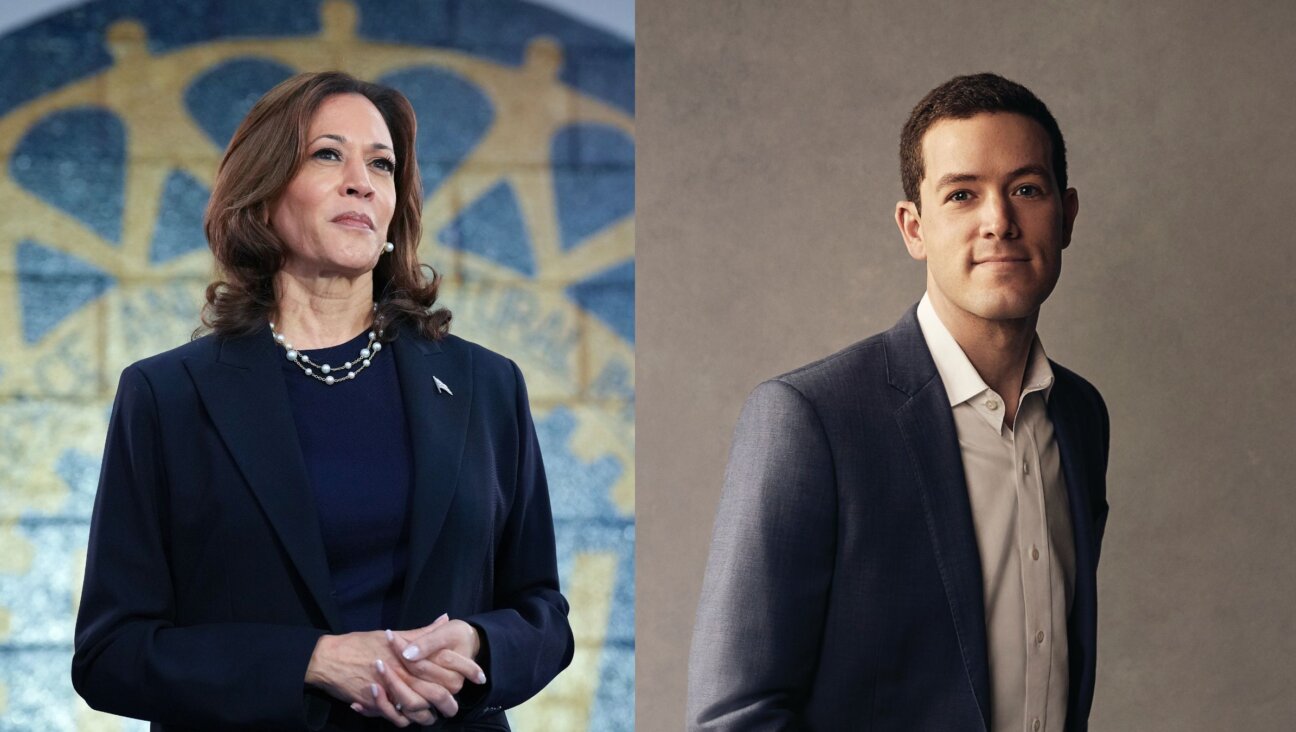Skating to ‘Schindler’s List,’ figure skater Jason Brown to make second trip to Winter Olympics

Jason Brown skates in the Men’s Free Skate during the U.S. Figure Skating Championships at Bridgestone Arena on January 09, 2022 in Nashville, Tennessee. (Photo by Matthew Stockman/Getty Images)
Jewish figure skater Jason Brown has competed around the world to the musical stylings of Simon and Garfunkel, “Hamilton” and Prince, but says no program has meant more to him than the one he’s taking to the 2022 Beijing Olympic Games: a free skate routine to the soundtrack of “Schindler’s List.”
“‘Schindler’s List’ is a piece of music that I wanted to skate to for so many years, but never felt like I was mature enough to skate to it the way that I envisioned I one day could,” Brown said. “To be able to do it on the Olympic stage is a huge honor. It’s a piece of music that has meant so much to me, and obviously to the community for years.”
(The soundtrack to the iconic Holocaust film has been a popular music choice among figure skaters since 1994 when Katarina Witt, a German Olympian, skated to its score.)
Named to the Olympic team following a fourth-place finish at the U.S. Figure Skating Championships in January, the 27-year-old skating veteran will have a second chance to take in the Olympic rings at the Beijing Games alongside teammates Nathan Chen, 22, and Vincent Zhou, 21.
Brown made his first trip to the Olympics at the 2014 Sochi Games, where he earned a bronze medal in the team event and placed ninth in the men’s singles portion. He was 19 then, and at the time, the youngest U.S. male singles skater named to an Olympic team in nearly 40 years.
“To go to those two extremes from being the youngest to being the oldest on the team, I think I come with a lot of experience and a lot of maturity. I’m excited to take everything that I’ve learned along the way and really apply it,” Brown said.
In the time since the Sochi Games, Brown has won a national championship, sustained a stress fracture, switched coaches and dealt with the obstacles of training during the pandemic. Outside of skating, he traded out his famous ponytail hairstyle in favor of a sleeker cut and opened up about being gay in an Instagram post last June.
“I think that’s what your 20s are all about. It’s trying to figure out your place in the world not only as an athlete, but as a person growing up and becoming independent and making your own decisions,” Brown said. “It’s been amazing for me to break a lot of those barriers, to find answers to a lot of the questions that I had, and to really come into my own.”
Visiting Yad Vashem in Israel
Part of Brown’s journey off-ice took him on a Birthright trip to Israel in 2016, where he traded triple axel drills and long program run-throughs for shawarma lunches and swimming in the Dead Sea. He recalled the liveliness of beachgoers in Tel Aviv, the powerful image of the Western Wall in Jerusalem, and gaining a newfound appreciation for hummus. Most long lasting, though, was the impact of his visit to Yad Vashem, where he remembered feeling a sense of community unlike anything he had previously experienced.
“It’s so easy as athletes to get hyper-focused and only think about our sport, and it was an amazing opportunity to just take a step back and be a kid, to be around people and learn and soak it up. The experience was something that will always be some of my most incredible memories.”
Brown started skating at three years old after his mom enrolled him and his sister in Learn to Skate classes at a local ice rink in Highland Park, Illinois. Long before Jason was a two-time Olympian, he spent his summers in a way many American Jews are familiar with: singing songs on Shabbat at Jewish summer camp. Attending URJ Olin-Sang-Ruby Union Institute from 2003-2008, Brown relished Friday nights, when counselors would lead the whole camp in singing ahead of a storytime from the camp director.
As Brown began to rise through the competitive ranks, he made the 2014 Olympic team, but failed to make it again in 2018 following a sixth place finish at nationals that year.
He called the time in his life following his failure to make the team an identity crisis that required soul searching, and looking beyond skating to find who he was outside of his Olympic abilities.
“Making the team at such a young age, you almost become that identity that you were when you made that team because that’s how the public sees you. That’s kind of even how I saw myself,” Brown said. “I went through a kind of evolution of trying to build back and find my self worth again, and find my identity outside of the parameters which I set for myself.”
Following the 2018 season, Brown switched from lifelong coach Kori Ade in Colorado to work with Brian Orser, Tracy Wilson and Karen Preston in Toronto, where he trains for six to seven hours a day, five days a week. Off the ice, Brown works on flexibility and strength by swimming, biking, taking pilates and doing physical therapy.
His four year plan paid off – leading up to his selection to the Beijing team were strong international performances that included a silver medal at the 2020 Four Continents Championships and medal finishes at all of his 2021-2022 season Grand Prix events for the first time in his career, including a gold at the 2022 Finlandia Trophy.
Approaching these Winter Games, he says he’s never felt stronger.
“Obviously you want to keep pushing yourself, but you also want to take it upon yourself to say ‘these things are what make me confident and make me strong,’” Brown said. “It’s not just ‘oh, I’m building the experience.’ Now it’s saying, ‘okay, I have the experience, time to apply it, get focused and trust yourself, trust that your body knows it.”
Ahead of the Feb. 4 opening ceremony of the Winter Games, Brown’s schedule is packed with training, conducting interviews with Team U.S.A. and preparing for the Games’ Covid-19 protocol, which will require an isolation period following his arrival on Jan. 31. While coaches Wilson and Orser will make the trip to Beijing with Brown, his family will watch his performances on television from places like Los Angeles and Chicago in the U.S.
After attuning to every fine detail to make his Olympic dream happen a second time around, Brown’s packing his bags for Beijing knowing he can savor the Olympic experience – and leave everything else out on the ice.






















